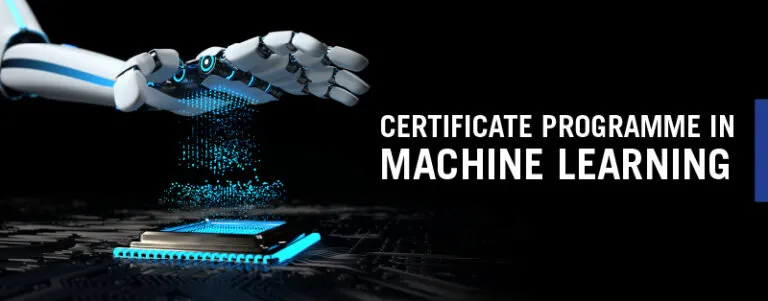5 Important Components of a Robust Artificial Intelligence Course Syllabus

AI continues to exercise its allure over professionals wanting to pursue it and users wanting to see how far it can make life easy. However, if you fall in the first category of aspiring AI professionals, then you need to build a strong foundation to leverage all that technology. A poorly designed artificial intelligence course syllabus, after all, can affect your chances of a successful career. Most Indian organizations are making a beeline for skilled professionals as AI becomes a more household term. In fact, India’s AI market is set to be worth between $17–221 billion by 2027.
Are you one of the people looking to ride this wave? You may do well to remember that a traditional course may not be enough to equip you for the future. It is therefore crucial to pick a course that will serve you not only in 2024 but in the future as well. So, let’s explore the key elements of an artificial intelligence course syllabus, why they matter, and how they can secure your future.
Why Opt for an Artificial Intelligence Course?
An AI course is a programme that teaches students the techniques to deploy AI solutions across various sectors. Not all courses, however, are built the same. An ideal artificial intelligence course syllabus has a versatile range, from foundational theories to practical skills for rolling out models in real-world applications. Here’s why AI programmes can be advantageous:
Best AI and ML Courses
-
Growing Demand
The demand for AI skills across industries such as finance, technology, and retail is soaring of late. You can open up doors to exclusive opportunities by gaining expertise through enrolling in a programme.
-
Driving Innovation
The insights from a strong artificial intelligence course syllabus allow you to foster innovation, automate tasks, and create solutions that improve overall efficiency.
-
Providing Versatility
An AI programme provides transferable skills, such as data analysis, programming, and model development, which are valuable across domains, and lend you flexibility consequently.
-
A Competitive Advantage
There is an increase in the number of companies adopting AI to gain a competitive edge. They need professionals who can lead this transition.
-
Enhancing Decision-Making
AI is shaping business strategy and operations in today’s times. As a result, a course equips you with the knowledge to make informed decisions about managing AI within your organization.
ALSO READ: AI in Management: Transforming Traditional Roles for a New Era
Key Artificial Intelligence Course Syllabus Subjects 
A typical artificial intelligence course syllabus covers a wide range of topics. Let’s check out the core ones:
-
Introduction to Artificial Intelligence
This foundational section introduces the fundamental concepts, history, and applications of AI. Students learn about different AI techniques as well as problem-solving approaches. It will include topics such as AI concepts, intelligent agents, search algorithms, and reasoning.
-
Machine Learning
This is one of the most important subjects because it teaches machines to learn from data without explicit programming. Students learn about various machine learning algorithms, model evaluation, and feature engineering. For example, supervised learning, unsupervised learning, reinforcement learning, and neural networks are a few common topics.
-
Natural Language Processing (NLP)
NLP facilitates the processing of human language for computers. Students learn about text-processing techniques, language models, and applications in various domains. The popular topics in this field include text preprocessing, tokenization, stemming, and sentiment analysis.
-
Computer Vision
Computer vision enables computers to interpret and understand visual information from the world. Students learn about image and video processing techniques, object detection, and image recognition. It deals with subjects such as image processing, feature extraction, object detection, and facial recognition.
-
Robotics
Robotics involves designing, building, and programming robots to perform tasks. Students learn about robot kinematics, dynamics, control systems, and sensor fusion.
ALSO WATCH: How do Cognitive Robots Impact Various Industries | Watch Now
What Should an Artificial Intelligence Course Syllabus Include?
A well-rounded artificial intelligence course syllabus should cover a balanced mix of theory, practical skills, and real-world applications. Here’s an overview:
-
Core Concepts
This will offer an overview of AI’s history, definitions, goals, and impact on society. You will learn about different types of AI and how it is used across industries. For example, narrow AI, general AI, and artificial superintelligence are a few types. In short, it covers all the topics covered in the previous heading.
-
Mathematics
The development of AI relies heavily on advanced mathematics. A syllabus should then include a section on it. For instance, linear algebra (vectors, matrices, and tensor operations), probability and statistics (Bayes theorem, statistical inference), and calculus (derivatives, gradients) can feature in the list.
-
Programming Foundations
Python is critical for AI. Hence, you need to learn about Python and its libraries such as NumPy, Pandas, and Matplotlib. Furthermore, you must cover data handling like preprocessing, cleaning, and transforming data and popular AI frameworks like TensorFlow, PyTorch, and Keras.
-
Deep Learning
Deep learning is a subset of machine learning dealing with neural networks. You will also learn about layers, pooling, and applications in image processing. Lastly, there needs to be a section on GANs (Generative Adversarial Networks) and autoencoders for synthetic data and anomaly detection.
-
AI Ethics
This is undeniably the most critical module that should be there in every course. It should cover everything from bias and fairness that identifies and mitigates algorithmic bias. Moreover, there should be transparency via interpretable models and explainability techniques besides data privacy.
-
Practical Growth
Theory alone is never going to be enough. You need to study AI project development, spanning data collection, model training, and evaluation. You must know how to leverage cloud platforms like AWS, Google Cloud, or Azure for deployment. There should also be a section on real-world AI projects to reinforce learning and showcase skills.
ALSO READ: Can AI Make Us More Inclusive? Here’s What You Need to Know
Tips to Pick the Right AI Programme
The first step in choosing an AI programme is to obtain clarity on your goals. Let’s see what follows next:
-
Curriculum
Look for a programme covering essential AI topics besides offering capstone projects to test your knowledge. Do not forget to check if the syllabus includes contemporary topics.
-
Faculty Expertise
You must look for faculty members with strong academic credentials and relevant industry experience. A faculty with a research background can provide insights into the latest developments.
-
Accreditation and Recognition
Always check if the programme is accredited by reputable organizations. These programmes are generally recognized by employers in the industry as well.
-
Networking
Look for programmes that offer job placement assistance and active alumni networks. Strong industry connections can provide valuable opportunities for exclusive jobs.
-
Cost and Financial Aid
Consider the overall cost, including tuition, fees, and living expenses. See if they offer scholarships and grants to fund your education smoothly.
ALSO READ: Making AI Smarter: Why Machines Need to Unlearn to Learn
Emerging Trends in Artificial Intelligence
The tech landscape is always in flux, so it is useful to keep track of trends that shape AI’s future. Here are some of the impactful ones:
-
Generative AI and Foundation Models
Generative AI is being used for art, music, design, and video generation, impacting fields like media, entertainment, and marketing. Their role will become more prominent with time.
-
Accountability
There’s an increasing need for transparency to ensure model decisions are understandable, especially in healthcare and finance. This will pave the way for tools to help people understand
AI model outcomes.
-
Edge AI and On-Device Processing
Edge AI allows AI computations to occur on local devices, reducing latency subsequently. This is particularly crucial in IoT, autonomous vehicles, and robotics.
-
AI for Sustainability and Climate Solutions
AI models are being used to monitor and predict climate changes, optimize resource use, and model the impact of environmental policies. This is going to be key given the state of the climate crisis today.
-
Quantum AI
Quantum computing holds the potential to significantly accelerate AI computations, making it possible to solve complex problems.
Is This the Right Course for You?
AI is no longer a futuristic concept but a transformative force reshaping societies. You need to get on the train before it leaves the station. To stay ahead in this evolving field, consider enrolling in one of the artificial intelligence courses at Emeritus. There is a programme for everyone from beginners to veterans.
| Skill Level | Programme | Features |
| Beginner | IIT Delhi’s Certificate Programme in Data Science & Machine Learning |
|
| Intermediate | IIM Kozhikode’s Professional Certificate Programme in Data Science and Artificial Intelligence for Managers |
|
| Expert | ISB’s Leadership With AI |
|
These courses equip you with the skills to succeed worldwide, not just in India. Sign up today and empower yourself to harness the power of AI!
Write to us at content@emeritus.org
Sources:

















